New Zealand Orders Month-Long Lockdown To Halt Spread Of Coronavirus

KEY POINTS
- Nonessential services like bars, cafes, restaurants and cinemas will be closed
- New Zealand has confirmed more than 100 cases of the virus, but no deaths yet
- New Zealand has already closed its borders to foreign travelers.
New Zealand’s Prime Minister Jacinda Ardern ordered a month-long lockdown for the country beginning on Wednesday to halt the spread of the coronavirus.
Schools and businesses will shut down, residents will be required to stay indoors and only essential services -- supermarkets, banks, pharmacies, doctor’s clinics, service stations and gas stations -- will be open.
Nonessential services like bars, cafes, restaurants and cinemas will be closed.
Public transport will be available only for those people who work in essential services.
New Zealand, a nation of 4.8 million, has confirmed more than 100 cases of the virus, but no deaths yet.
New Zealand has already closed its borders to foreign travelers.
Ardern said that community transmission of the virus was taking place in New Zealand and that, in a worst case, the number of cases would double every five days, meaning that ultimately tens of thousands of people could die.
“The worst case scenario is simply intolerable, it would represent the greatest loss of New Zealanders’ lives in our history and I will not take that chance.” Ardern said. “I say to all New Zealanders: the government will do all it can to protect you. Now I’m asking you to do everything you can to protect all of us. Kiwis – go home.”
If the number of new virus infections slows down after a month, the lockdown will be partly relaxed in specific areas, she added.
“The situation here is moving at pace, and so must we. The trajectory is very clear, act now or risk the virus taking hold as it has elsewhere,” Ardern added. “We currently have 102 cases, but so did Italy once, now the virus has overwhelmed their health system, and hundreds of people are dying every day. Today, get your neighbor’s phone number, set up a community group chat, get your gear to work from home, cancel social gatherings of any size or shape, prepare to walk around the block while keeping a two-meter [6.5 feet] distance between you. If in doubt, don’t go out.”
After Ardern’s announcement, New Zealand witnessed panic buying at grocery and liquor stores, while phone lines were overwhelmed.
New Zealand’s stock market plunged 8.65% on Monday.
Ardern also noted that police officers and even the military will enforce the lockdown.
“We don’t want to get to a place where we need to enforce these instructions, but we will if required,” said Commissioner of Police Mike Bush.
It is an unprecedented scenario for the country.
“We are all as a nation preparing to go into self-isolation, in the same way we have seen many other nations do,” Ardern added. “These measures will place the most significant restrictions on New Zealanders’ movements in modern history, this is not a decision taken lightly but it is our best chance to slow the virus and save lives. I know what I am asking for is significant, but I ask New Zealanders to move through this next phase in an orderly way.”
Simon Bridges, the opposition leader, as well as scientists and public health experts had been calling for shutdown.
Finance minister Grant Robertson said he might introduce a universal basic income for all New Zealanders. Otherwise, New Zealanders might be able to access their superannuation accounts early, like Australians already can. Robertson also said the shutdown has the support of the business community.
Robertson also said the government will inject NZ$4 billion [$2.3 billion] into the economy over the next eleven weeks. He also unveiled support for mortgage holders, a business finance guarantee scheme and a freeze on all rent hikes.
“We cannot guarantee to stop all job losses, but we are doing our best to cushion the blow,” Robertson said.
Australia, which has reported thousands of virus, cases, started some lockdown measures on Monday, but has not imposed self-isolation.
© Copyright IBTimes 2024. All rights reserved.





















